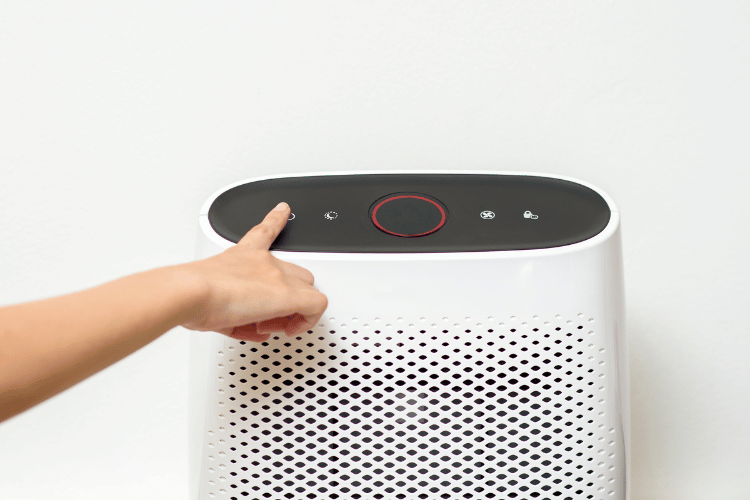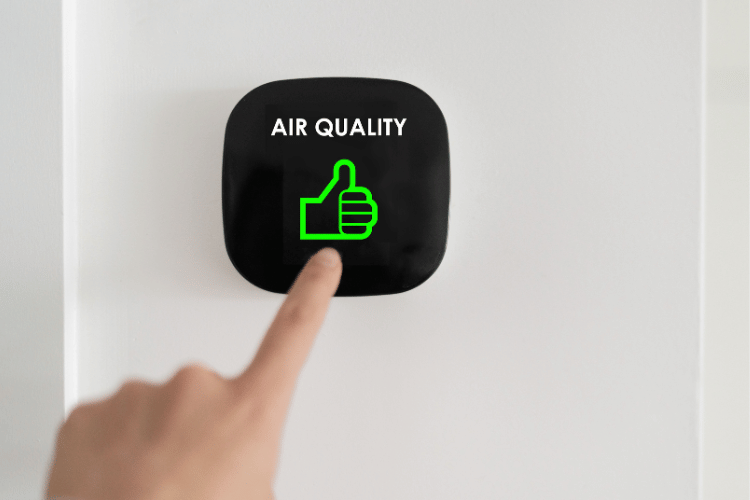
- By greenair-cy
- In Air Cooling
Air Pollution in Cyprus: How an Air Purifier Can Help
Air pollution is an increasingly serious problem in Cyprus. High levels of air pollution have been linked to a number of health problems. These include heart disease, stroke, and respiratory illnesses. The World Health Organization (WHO) has identified Cyprus as one of the countries with the highest concentrations of particles in the air. This article will discuss how air pollution affects health in Cyprus, sources of air pollution, and how air purifiers can help.
The quality of indoor air is just as important as outdoor air. An Air purifier can be used to remove pollutants from indoor environments. The aim is to provide a safe haven from dangerous particles in the atmosphere of Cyprus. They are becoming increasingly popular among people living and working in areas with high levels of atmospheric pollution. In this article, we will discuss the different available types of an air purifier in Cyprus. We will also discover their benefits regarding our health.
Finally, we will provide tips on choosing the right air purifier for your specific needs. Whether you live or work in an area with high levels of pollution, investing in an air purifier is a great way to protect yourself from the potential health risks associated with poor indoor air quality. In this article, we will explore how air purifiers can help improve indoor air quality and reduce the impact of outdoor pollutants on our health.
Health Effects of Air Pollution in Cyprus
We can link air pollution to a wide range of health problems. In Cyprus, air pollution is responsible for a number of serious diseases and ailments, such as respiratory issues, heart disease, and stroke. According to the European Environment Agency (EEA), particulate matter (PM) concentrations exceed EU standards across much of Cyprus. PMs are tiny particles that can easily be inhaled into the lungs, causing inflammation and irritation. Long-term exposure to these pollutants increases the risk of developing cardiovascular and respiratory diseases.
The WHO estimates that more than 1000 deaths per year in Cyprus can be attributed to exposure to air pollution. Air pollutants have also been found to cause eye irritation and aggravate existing allergies and asthma. These pollutants can also have an adverse effect on pregnant women, increasing the risk of preterm birth. In addition to these direct health effects, air pollution has been linked to other issues such as decreased cognitive function in children and reduced productivity in workers.
Air pollution is a serious problem in Cyprus that needs to be addressed urgently. The good news is that air purifiers can help reduce the impact of outdoor air pollutants on our health by providing clean, safe indoor environments. We will discuss how air purifiers work and their benefits for health in the next section.
Comparing Cyprus to other countries
Country | Cases of Asthma + Allergy (annual) | Cases of Heart Disease (annual) | Premature Deaths due to Air Pollution (annual)
Cyprus | 10,000 | 5,000 | 1,000
France | 8,800 | 4,700 | 900
Bulgaria| 7,400| 3,500| 800
Spain| 9,100| 4,900| 950
UK | 8,300 | 4,400 | 850
Sources of Air Pollution in Cyprus
In Cyprus, air pollution is primarily caused by burning fossil fuels. Power plants and industrial sites are the biggest sources of atmospheric pollutants in the country, releasing dangerous particles into the atmosphere on a daily basis.
Vehicles contribute to air pollution levels as well, with exhaust fumes containing carbon dioxide and other harmful particles that can have serious health effects.
In addition to this, agricultural activities such as burning crop stubble and using chemical fertilizers also contribute to air pollution in Cyprus.
The EEA has found that Cyprus exceeds EU limits for particulate matter (PM10) concentrations across much of the island. PM10 consists of tiny particles smaller than 10 micrometers which enter deep into our lungs and bloodstream upon inhalation, leading to respiratory problems and other ailments. In addition, nitrogen dioxide (NO2) concentrations have been found to exceed EU limits in some areas as well. NO2 is a harmful gas that can aggravate respiratory issues such as asthma, making air purifiers even more important for people living in these regions.
Furthermore, numerous studies show that dust storms originating from the Sahara Desert up to 2000 km away significally affect Cyprus’ air quality. These dust storms bring with them a high concentration of particulate matter which exacerbates already high levels of air pollution on the island. Air purifiers provide an effective solution for reducing indoor air pollution levels caused by such dust storms.

How Air Purifiers Work
Air purifiers work by removing pollutants from the air. For this procedure, there is a combination of filtration and adsorption technologies. Filters capture large particles such as dust, dander, and pollen while adsorbent materials such as activated carbon absorb small particles like gases and odors. Air purifiers come in different sizes and types, so it’s important to choose one that fits your needs.
HEPA filters are one of the most common types of air filters that air purifiers use. HEPA stands for high-efficiency particulate air, and these filters can capture up to 99.97% of tiny particles even smaller than 0.3 micrometers in size. They’re great for removing allergens such as dust mites, dander, and pollen from the air.
Activated carbon filters are also used in air purifiers to absorb odors and chemical compounds such as tobacco smoke and VOCs (volatile organic compounds). These filters are highly efficient at removing gases, odors, and other airborne contaminants. They’re most effective when combined with a HEPA filter for increased protection against pollutants.
Ionizers are another type of air purifier technology that emits negative ions into the air. These ions attach to airborne particles such as dust or pollen, making them too heavy to stay airborne. The particles then fall out of the airstream and settle onto surfaces where they can be vacuumed up later. Studies show that ionizers reduce airborne contaminants such as dust, pollen, and smoke particles.
Some air purification systems can also use UV air purifiers. They use ultraviolet light to kill bacteria and other microorganisms in the air, making them an effective way to reduce the spread of viruses and germs. While they’re not as efficient at removing particulate matter as HEPA or carbon filters, UV air purifiers can still be helpful for improving indoor air quality.
Benefits of Air Purifiers for Health
Air purifiers can provide many health benefits, especially in areas with high air pollution levels. Studies have shown that using an air purifier at home can result in a significant decrease in exposure to particulate matter and other airborne contaminants. This reduction in exposure can help alleviate respiratory problems such as asthma, allergies, and bronchitis. Additionally, using an air purifier may reduce the risk of more serious illnesses caused by long-term exposure to polluted air.
Health Benefits using HEPA Filters
HEPA filters are particularly effective at reducing indoor air pollution. They can capture particles as small as 0.3 micrometers which makes them ideal for removing allergens like pollen, dust mites, pet dander, and mold spores from the air. This helps to reduce symptoms associated with airborne allergies and asthma.
Health Benefits using Activated Carbon Filters
Air purifiers can also help improve air quality in homes or offices where smoking is common. Activated carbon filters are effective at removing smoke particles, as well as odors and other irritating gases from the air. This can make it easier to breathe in areas where tobacco smoke is present.
Overall benefits
Using an air purifier in Cyprus may reduce the risk of contracting certain illnesses caused by long-term exposure to polluted air. Studies have shown that using an air purifier can significantly reduce concentrations of particulate matter in the air. This may help protect against a variety of respiratory problems such as bronchitis and COPD (chronic obstructive pulmonary disease). Additionally, UV air purifiers can help reduce the spread of viruses and other airborne microbes, providing added protection from certain illnesses.

Choosing the Right Air Purifier for Your Needs
When choosing an air purifier, it’s important to consider your needs and the size of the space you want to clean. Air purifiers come in a variety of sizes and with different types of filters. So, make sure to get one that can handle the amount of air you need to circulate. Additionally, check what type of filter it uses. For example, HEPA filters are generally the most effective at removing particles from the air.
If you suffer from allergies or asthma, consider getting a unit with a high-efficiency particle arresting (HEPA) filter. These filters can capture particles as small as 0.3 micrometers which makes them ideal for stopping allergens. These may be pollen, dust mites, pet dander, and mold spores. Additionally, many air purifiers also come with activated carbon filters which are effective at removing smoke particles and other gases from the air.
If you live in a humid climate, consider getting an air purifier with a dehumidifying option. This will help reduce humidity levels in your home and make it easier to breathe. Finally, UV air purifiers can be helpful for reducing airborne microbes like bacteria and viruses. However, keep in mind that they may not be as effective as HEPA or carbon filters for removing particulate matter from the air.
Overall, make sure it has the right filter for your needs. It’s important to also consider any extra features that may be beneficial depending on your climate. With the right air purifier, you can breathe easier knowing you’re helping to improve the air quality in your home.
Conclusion
Overall, air purifiers offer many health benefits for people living in areas with high levels of air pollution. For instance, they provide relief from allergies and asthma symptoms. They may also help reduce the risk of more serious illnesses caused by long-term exposure to polluted air. Additionally, using an air purifier may make it easier to breathe in homes or offices where smoking is common. For these reasons, air purifiers are a great way to improve indoor air quality and protect your family’s health.
The Air purifier is an important investment for anyone living in a region where air pollution is a major concern. It may not be able to completely eliminate all pollutants from the air. However, it can reduce concentrations of many dangerous particles and help protect against certain illnesses.
Therefore, it’s certain that the air purifier is an effective tool for improving indoor air quality in Cyprus. You can help improve the air quality in your home rooms or workspace. By doing this, you give yourself peace of mind knowing that you’re protecting your family from the harmful effects of air pollution.
So start looking into the best air purifier for your needs today. You should also make sure to keep up with regular maintenance to ensure its effectiveness.
For more information, contact Green Air. We provide professional consultations on air purifier solutions that can satisfy your specific needs. We guarantee a healthier indoor living environment for you and your family.
